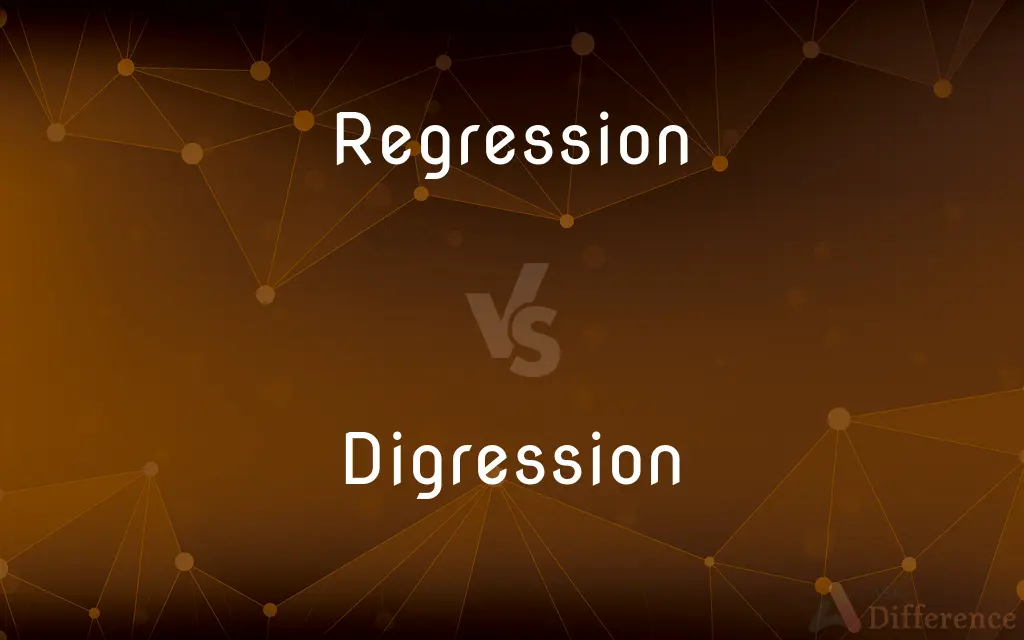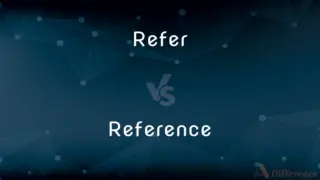Regression vs. Digression — What's the Difference?
Edited by Tayyaba Rehman — By Urooj Arif — Updated on March 21, 2024
Regression involves returning to a former state or condition, while digression entails straying off the main topic or path.

Difference Between Regression and Digression
Table of Contents
ADVERTISEMENT
Key Differences
Regression is typically associated with a return to a previous state or level in various contexts such as psychological development, statistical analysis, or even physical processes. It implies a backward movement or step in development, performance, or progress. On the other hand, digression occurs when the subject moves away from the main topic or path in conversation, literature, or thought, often temporarily and purposefully to add depth or detail.
Regression in psychology, for instance, can be seen when an individual exhibits behaviors that were prevalent at an earlier stage of development, often as a response to stress or trauma. Digression, conversely, might be a conversational tactic where someone veers off the main subject to provide additional information, anecdotes, or context before returning to the main point.
In the realm of statistics, regression is a critical tool used to understand the relationship between variables and to predict outcomes. It seeks to find the line or curve that best fits the data, reflecting a step towards understanding underlying patterns. Whereas, digression in this context would be less relevant, but in a broader sense, could refer to discussions or explanations that deviate from the central analysis or findings.
Regarding literary or rhetorical devices, regression can manifest in narratives that revisit past events or earlier points in a story to build context or enhance understanding. Digression in literature, however, is a deliberate departure from the main storyline or argument, often used to explore subplots, develop characters, or inject humor, thereby enriching the narrative despite the deviation.
In physical or scientific processes, regression can describe the reversal of conditions to a former state, like the regression of a shoreline due to erosion. Digression, though not commonly used in a physical context, could metaphorically describe the deviation from a straightforward path in scientific explorations or discussions.
ADVERTISEMENT
Comparison Chart
Definition
A return to a previous state or condition.
A departure from the main subject in speech or writing.
Context
Psychology, statistics, physical processes.
Conversations, literature, discourse.
Purpose/Outcome
Often viewed as a step back or a reduction in progress or development.
Used to provide additional information, context, or entertainment.
Implication
Can imply a negative connotation, suggesting loss or deterioration.
Neutral or positive, as it can enrich the main topic with new angles.
Usage in Language
More commonly used in technical, scientific, and psychological discussions.
More prevalent in literary, rhetorical, and conversational contexts.
Compare with Definitions
Regression
Returning to a former state.
After the trauma, she experienced a regression in her coping abilities.
Digression
Straying from the main point in a conversation to discuss an unrelated topic.
The professor's digression into personal anecdotes made the lecture more engaging.
Regression
A decrease in performance or quality.
The team's regression this season was unexpected.
Digression
A temporary departure from the main subject in speech or writing.
Her digression into her childhood memories added depth to her lecture.
Regression
Reverting to an earlier developmental stage.
Under stress, he showed signs of regression to childhood behaviors.
Digression
A rhetorical device used to provide additional information or entertain.
The author's digression into folklore enriched the novel's narrative.
Regression
The act of moving backward or receding.
The regression of the glacier was a clear sign of global warming.
Digression
Deviating from the planned or expected course.
The meeting's digression into trivial matters wasted valuable time.
Regression
In statistics, a method to predict the value of a dependent variable based on the value of one or more independent variables.
The researcher used linear regression to predict outcomes based on historical data.
Digression
The act of diverging from the direct path or line.
The river's digression created a series of small islands.
Regression
The process or an instance of regressing, as to a less perfect or less developed state.
Digression
Digression (parékbasis in Greek, egressio, digressio and excursion in Latin) is a section of a composition or speech that marks a temporary shift of subject; the digression ends when the writer or speaker returns to the main topic. Digressions can be used intentionally as a stylistic or rhetorical device.
Regression
(Psychology) In psychoanalytic theory, reversion to an earlier or less mature stage of psychological development.
Digression
The act of digressing.
Regression
(Medicine) Subsidence of the symptoms or process of a disease.
Digression
An instance of digressing, especially a written or spoken passage that has no bearing on the main subject.
Regression
(Statistics) A technique for predicting the value of a dependent variable as a function of one or more independent variables in the presence of random error.
Digression
An aside, an act of straying from the main subject in speech or writing.
The lectures included lengthy digressions on topics ranging from the professor's dog to the meaning of life.
Regression
(Astronomy) Retrograde motion of a celestial body.
Digression
The act of straying from the main subject in speech or writing, (rhetoric) particularly for rhetorical effect.
Make digression... by way of digression...
Regression
(Geology) A relative fall in sea level resulting in deposition of terrestrial strata over marine strata.
Digression
(obsolete) A deviancy, a sin or error, an act of straying from the path of righteousness or a general rule.
Regression
An action of regressing, a return to a previous state.
Digression
A deviation, an act of straying from a path.
Regression
An action of travelling mentally back in time.
Digression
An elongation, a deflection or deviation from a mean position or expected path.
Regression
(psychotherapy) A psychotherapeutic method whereby healing is facilitated by inducing the patient to act out behaviour typical of an earlier developmental stage.
Digression
The act of digressing or deviating, esp. from the main subject of a discourse; hence, a part of a discourse deviating from its main design or subject.
The digressions I can not excuse otherwise, than by the confidence that no man will read them.
Regression
(statistics) An analytic method to measure the association of one or more independent variables with a dependent variable.
Digression
A turning aside from the right path; transgression; offense.
Then my digression is so vile, so base,That it will live engraven in my face.
Regression
(statistics) An equation using specified and associated data for two or more variables such that one variable can be estimated from the remaining variable(s). Category:en:Functions
Digression
The elongation, or angular distance from the sun; - said chiefly of the inferior planets.
Regression
(programming) The reappearance of a bug in a piece of software that had previously been fixed.
Digression
A message that departs from the main subject
Regression
(medicine) The diminishing of a cellular mass like a tumor, or of an organ size.
Digression
A turning aside (of your course or attention or concern);
A diversion from the main highway
A digression into irrelevant details
A deflection from his goal
Regression
(exercise) The making an exercise less straining to perform by manipulating the details of its performance like loaded weight, range of motion, angle, speed.
Digression
Wandering from the main path of a journey
Regression
The act of passing back or returning; retrogression; retrogradation.
Regression
An abnormal state in which development has stopped prematurely
Regression
(psychiatry) a defense mechanism in which you flee from reality by assuming a more infantile state
Regression
The relation between selected values of x and observed values of y (from which the most probable value of y can be predicted for any value of x)
Regression
Returning to a former state
Common Curiosities
What is the purpose of digression in literature?
In literature, digression is used to add depth, detail, or entertainment, enriching the narrative or argument.
How does regression work in statistics?
In statistics, regression analyses the relationship between variables to predict outcomes based on historical data.
Can regression be positive?
Regression is typically viewed negatively, as it suggests a step back, but in some contexts, like a retreat to reconsider options, it might be positive.
What is regression in psychology?
In psychology, regression refers to reverting to earlier stages of behavior, often as a defense mechanism.
Is digression always irrelevant?
Not necessarily; digression can provide valuable context, background, or relief, enhancing the main topic or discussion.
Can regression indicate progress?
While regression typically indicates a reversal, in some contexts like iterative design, it can be part of the progress process.
Can digression be a sign of a disorganized thought process?
Excessive or irrelevant digression can indicate disorganization, but when used effectively, it reflects a sophisticated narrative technique.
How can digression be effectively used in speeches?
In speeches, effective digression can engage the audience, providing relatable examples or humorous interludes.
What is the difference between regression and retrogression?
Regression implies a return to a previous state, while retrogression suggests a more significant decline or degeneration.
How is digression perceived in academic writing?
In academic writing, digression should be used sparingly and purposefully, as it can distract from the main argument.
What causes regression in individuals?
Regression in individuals can be caused by stress, trauma, or as a response to challenging situations.
What role does digression play in storytelling?
In storytelling, digression can add layers, develop characters, or introduce subplots, enhancing the overall story.
Can regression be temporary?
Yes, regression can be a temporary response to specific triggers or circumstances, from which recovery is possible.
Are there different types of regression in statistics?
Yes, there are multiple types, including linear, logistic, and polynomial regression, each suited to different data types and relationships.
How do professionals address regression in therapy?
Professionals address regression by identifying underlying causes, providing support, and developing coping strategies to foster progress.
Share Your Discovery

Previous Comparison
Cut vs. Nick
Next Comparison
Refer vs. ReferenceAuthor Spotlight
Written by
Urooj ArifUrooj is a skilled content writer at Ask Difference, known for her exceptional ability to simplify complex topics into engaging and informative content. With a passion for research and a flair for clear, concise writing, she consistently delivers articles that resonate with our diverse audience.
Edited by
Tayyaba RehmanTayyaba Rehman is a distinguished writer, currently serving as a primary contributor to askdifference.com. As a researcher in semantics and etymology, Tayyaba's passion for the complexity of languages and their distinctions has found a perfect home on the platform. Tayyaba delves into the intricacies of language, distinguishing between commonly confused words and phrases, thereby providing clarity for readers worldwide.
















































